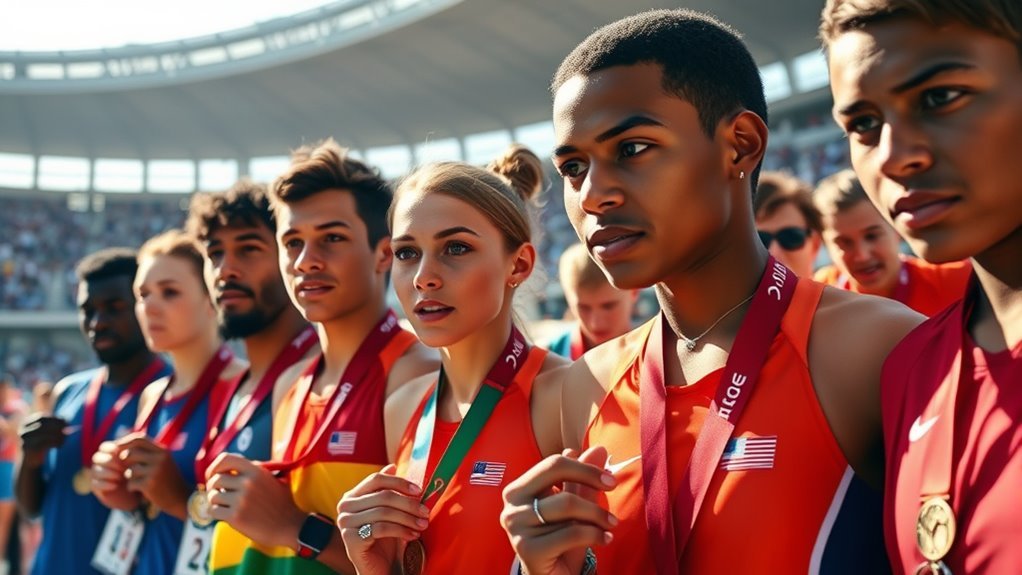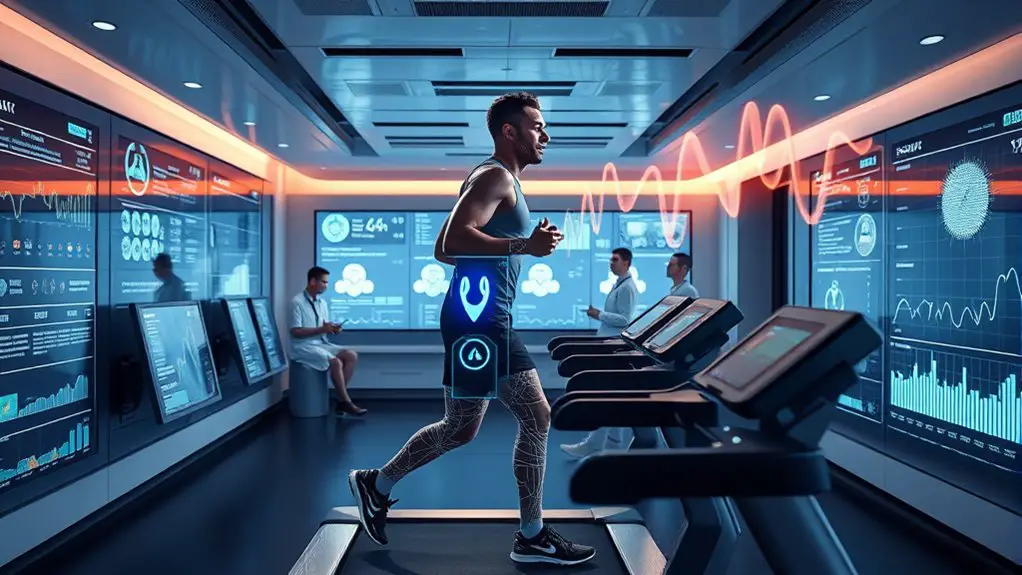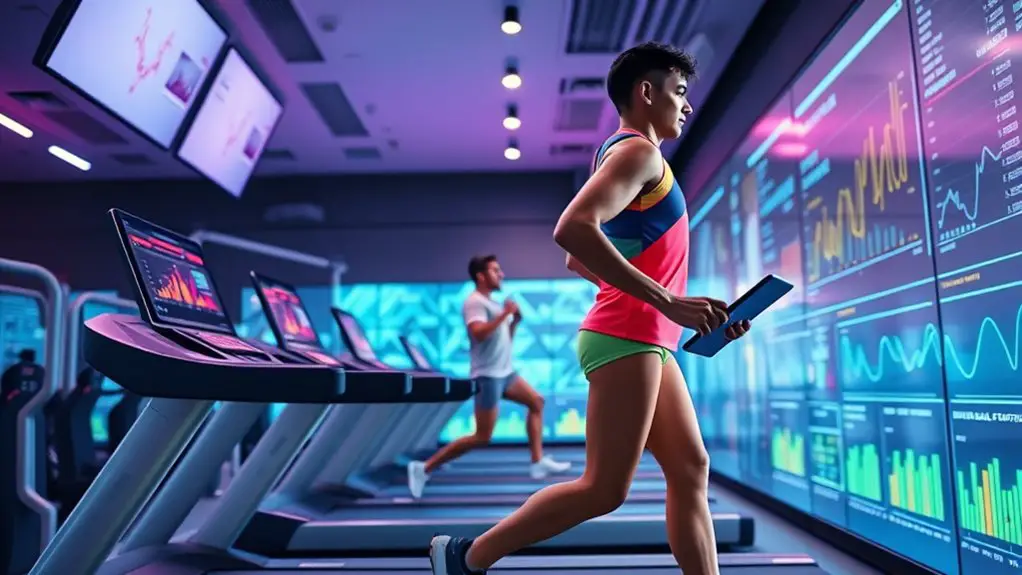AI plays an essential role in personalized sports coaching by analyzing performance data to tailor training programs just for you. It uses real-time analytics to track your progress and adjust workouts, enhancing your strengths while addressing weaknesses. With predictive modeling, AI can also foresee potential injury risks, enabling preventive measures. Plus, it offers mental conditioning techniques to boost your focus and resilience. There's so much more to explore about how this technology transforms coaching and your performance journey.
Understanding AI and Its Applications in Sports
As technology evolves, understanding AI and its applications in sports becomes essential for athletes and coaches alike. AI advancements are reshaping sports analytics, enabling you to analyze performance metrics with unprecedented precision. With machine learning, intelligent systems can predict outcomes and refine coaching methodologies, giving you a competitive edge.
By integrating technology into training routines, you enhance athlete engagement and optimize performance. Data visualization tools help make complex statistics digestible, allowing for informed decisions. Predictive modeling can also forecast injuries or performance dips, helping you adjust training regimens proactively. Additionally, wearable technology is revolutionizing how athletes monitor their biomechanics and manage training loads, providing critical insights for injury prevention.
As you embrace these innovations, remember that the freedom to explore new strategies and enhance your skills is at your fingertips. Leveraging AI in sports isn't just about optimization—it's about revealing your potential and redefining what's possible. The future of sports coaching is here, and it's driven by the power of intelligent systems.
The Importance of Data in Personalized Coaching
When it comes to personalized coaching, data is your best friend. It offers performance insights that help you understand your strengths and weaknesses, allowing you to focus on what really matters. With tailored training regimens based on this data, you can maximize your potential and enhance your performance. Additionally, real-time analytics can empower coaches to make dynamic adjustments to training programs that align with an athlete's evolving performance metrics.
Data-Driven Performance Insights
Data plays an essential role in personalized sports coaching, transforming how athletes train and perform. By harnessing performance metrics, coaches can pinpoint your strengths and weaknesses, tailoring insights to elevate your game. Imagine receiving real-time athlete feedback that helps you understand your movements and techniques better. This data-driven approach empowers you to make informed decisions about your training, fostering a sense of freedom in your athletic journey. You're no longer just following a generic plan; instead, you're engaging with insights that resonate with your unique needs. As you track your progress, you'll see how data can enhance your performance, allowing you to break barriers and achieve your goals with confidence. Embrace the power of data, and reveal your full potential!
Tailored Training Regimens
Harnessing performance metrics not only provides insights but also paves the way for tailored training regimens that cater specifically to your athletic journey. By leveraging individualized metrics, you can create adaptive workouts that respond to your unique strengths and weaknesses. Imagine having a coach who understands your body's nuances, adjusting your training plan in real-time to enhance performance and prevent injuries. With data-driven approaches, your workouts become more than just routines; they evolve into personalized experiences that empower you to push your limits. Embracing this freedom means you're not just training harder, but smarter, ensuring every session is aligned with your goals. In the world of sports, that's the key to revealing your full potential.
How AI Analyzes Athlete Performance
AI is transforming how athlete performance is analyzed, offering insights that were once unimaginable. By gathering performance metrics through wearable devices and video analysis, it provides a thorough view of how you're performing. Imagine having real-time data on your speed, endurance, and technique—all at your fingertips. This data isn't just numbers; it's a pathway to understanding your strengths and weaknesses.
With AI, athlete feedback becomes instantaneous and personalized. Instead of waiting for a coach's observations, you can see how you stack up against your goals and competitors right away. This immediate feedback empowers you to make adjustments on the fly, enhancing your performance and giving you the freedom to explore your potential without the usual constraints. Furthermore, proper hydration strategies can significantly impact your overall performance, ensuring you maintain the energy needed to excel.
In this data-driven world, you're not just an athlete; you're an informed competitor ready to take your game to the next level.
Customizing Training Programs With AI
As you aim to enhance your athletic performance, customizing your training program with advanced technology can make all the difference. AI-driven systems leverage adaptive learning to create tailored workouts that keep you engaged and motivated. These programs analyze your strengths and weaknesses, adjusting in real-time to optimize your training experience.
Here's how AI can help:
| Feature | Benefit | Example |
|---|---|---|
| Adaptive Learning | Personalized workouts | Customized sprint drills |
| Athlete Engagement | Keeps you motivated | Gamified challenges |
| Progress Tracking | Monitors improvement | Weekly performance stats |
| Flexibility | Adjusts to your schedule | On-the-go routines |
| Feedback Mechanism | Instant insights | Post-workout analysis |
With AI, you can embrace the freedom to explore your potential while enjoying a training program designed just for you. Additionally, integrating quality sleep into your routine can further enhance recovery and performance, making your training even more effective.
Real-Time Monitoring and Feedback
While you're pushing your limits during training, real-time monitoring and feedback can provide invaluable insights that enhance your performance. With wearable technology like smartwatches and fitness trackers, you can track your heart rate, pace, and other key metrics as you go. This instant data helps you make quick adjustments, ensuring you're always in the zone and maximizing your effort.
Engaging with these tools not only boosts athlete engagement but also fosters a sense of autonomy in your training. You get to decide when to push harder or back off, creating a personalized experience tailored to your needs. Furthermore, the immediate feedback allows you to see your progress in real-time, keeping motivation high. By utilizing real-time heart rate monitoring, you can optimize your workouts and prevent potential injuries. Embracing this technology empowers you to break barriers and reach new heights, all while enjoying the freedom to train on your own terms. Immerse yourself in the future of sports coaching and elevate your game with real-time insights!
Enhancing Injury Prevention and Recovery
When it comes to enhancing injury prevention and recovery, AI's role is essential. By using predictive analytics, you can identify potential injury risks before they happen, allowing you to adjust your training routines accordingly. Additionally, customized rehabilitation protocols can help you recover more effectively, tailoring your recovery process to your specific needs. Incorporating proper warm-ups into your training can further reduce the likelihood of injuries and enhance overall performance.
Predictive Analytics for Injuries
Injuries can derail an athlete's career, but predictive analytics offers a powerful tool for enhancing injury prevention and recovery. By leveraging data from training loads, biomechanics, and past injuries, you can gain insights into injury prediction. This means you can anticipate potential risks before they turn into serious setbacks. With this knowledge, you can adjust your training regimen to minimize those risks, allowing you to push your limits while staying safe.
Moreover, predictive analytics aids in recovery optimization. By analyzing recovery patterns and responses, you can tailor your rest and rehabilitation strategies for maximum effectiveness. This proactive approach not only keeps you in the game longer but also empowers you to achieve your personal best without the constant fear of injury.
Customized Rehabilitation Protocols
Customized rehabilitation protocols not only cater to an athlete's unique needs but also play an essential role in enhancing injury prevention and recovery. By leveraging rehabilitation technology, you can create a tailored plan that accelerates your injury recovery process while ensuring your body stays resilient against future injuries.
| Phase | Focus Area | Rehabilitation Tools |
|---|---|---|
| Initial Recovery | Pain Management | Ice therapy, Compression |
| Strength Building | Muscle Reinforcement | Resistance training, Bands |
| Functional Training | Sport-Specific Skills | Movement drills, Simulations |
These protocols allow you to regain strength and confidence, empowering you to pursue your passion without fear. So embrace the freedom of personalized rehab, and get back to doing what you love!
The Role of AI in Mental Conditioning
As athletes endeavor to enhance their performance, the integration of AI in mental conditioning offers innovative solutions that can transform how you prepare psychologically. AI can analyze your emotional and cognitive states in real-time, helping you identify areas for improvement. With tailored mental resilience techniques, you can develop a stronger mindset, allowing you to push through challenges and maintain focus under pressure.
Moreover, AI-driven cognitive performance strategies can guide you in practicing visualization and mindfulness exercises that fit your unique needs. Imagine having personalized mental workouts that adapt based on your progress. This freedom to explore different techniques empowers you to find what resonates with you, ultimately enhancing your overall performance. By embracing AI in your mental conditioning routine, you're not just improving your game; you're redefining how you approach competition and personal growth. Furthermore, incorporating mindfulness meditation into your regimen can further enhance focus and reduce anxiety, leading to even greater performance gains. Embrace this tech-savvy dimension of coaching, and watch your psychological preparation soar.
Case Studies: Successful Integration of AI in Coaching
Success stories abound in the domain of AI-driven coaching, showcasing how technology can elevate athletic performance. You'll see how AI success stories transform coaching innovations into practical applications, enhancing athlete engagement and performance analytics.
- Personalized Training Regimens: AI analyzes individual data to craft tailored workout plans that push athletes beyond their limits. Incorporating strength training exercises into these regimens can significantly enhance performance outcomes.
- Real-Time Feedback: Coaches leverage AI tools for immediate performance insights, enabling athletes to adjust techniques on-the-fly.
- Enhanced Recovery Protocols: Algorithms assess recovery needs, ensuring athletes maximize their downtime for peak performance.
These case studies highlight the freedom AI brings to coaching, allowing athletes to harness their potential like never before. By integrating AI, coaches can focus on strategy and motivation while technology handles the data. The result? A dynamic partnership that fuels athletic excellence and personal growth.
Future Trends in AI and Sports Coaching
The integration of AI in coaching has already proven transformative, but the future holds even more exciting possibilities. As AI advancements continue, you can expect groundbreaking coaching innovations that enhance athlete engagement. Future technologies, like advanced sports analytics and digital platforms, will revolutionize how you track performance metrics. Imagine virtual coaching sessions tailored to your unique needs, utilizing adaptive learning to optimize your training experience. Additionally, VR training will provide immersive environments that allow you to practice techniques and decision-making skills in a safe, controlled setting. Interactive training will make it easier for you to connect with coaches and peers, fostering a sense of community and support. By leveraging these tools, you'll gain a competitive edge, as they enable more precise and efficient coaching. The focus on coaching efficiency will allow you to maximize your potential without the constraints of traditional methods. Embracing these trends not only empowers you as an athlete but also redefines what's possible in sports coaching for everyone.
Ethical Considerations in AI-Driven Coaching
As AI takes a bigger role in sports coaching, you need to think about the ethical implications it brings. Data privacy concerns, potential bias in algorithms, and the need for transparency in decision-making are just a few issues that can't be ignored. How can you guarantee that these technologies benefit athletes without compromising their rights or fairness?
Data Privacy Concerns
While personalized sports coaching offers incredible benefits, it also raises significant data privacy concerns that can't be ignored. You must consider how your data is handled and who truly owns it. Here are some key points to reflect on:
- Data Ownership: Understand that your personal information should remain yours; it's crucial to know who controls it.
- Consent Management: Make sure you're fully informed about how your data will be used, and give explicit permission before sharing.
- Transparency: Demand clarity from coaches and platforms about data practices to protect your privacy.
Bias in Algorithms
When algorithms drive personalized sports coaching, it's vital to recognize that biases can seep into the data, potentially skewing results and recommendations. Algorithmic bias can arise from insufficient diversity representation in training datasets, leading to unfair outcomes. You might find that certain athletes receive tailored coaching while others are overlooked due to these training disparities. Fairness metrics can help identify and mitigate these biases, but transparency issues often cloud data interpretation. Coaches and athletes alike should demand clearer insights into how decisions are made. Embracing diversity in data sources and ensuring equitable representation can empower more balanced coaching strategies. Ultimately, fostering an environment that values fairness promotes freedom and enhances performance for all athletes.
Transparency in Decision-Making
Although AI can revolutionize sports coaching, ensuring transparency in decision-making remains essential for ethical practice. You've got to understand how AI systems operate, especially when they impact your training and performance. Transparency frameworks help clarify these complex decision-making processes, allowing you to trust the guidance you receive.
- Clear Communication: Coaches should explain how AI recommendations are derived.
- Accountability: Knowing who's responsible for decisions fosters trust in the coaching process.
- Informed Choices: When you understand AI's logic, you can make better decisions about your training.
Embracing transparency not only empowers you but also promotes a culture of openness, ultimately enhancing your athletic journey. You deserve to know how technology shapes your path to success.
Frequently Asked Questions
How Accessible Is AI Technology for Amateur Coaches and Athletes?
AI technology's becoming increasingly accessible for amateur coaches and athletes. With the rise of affordable apps and online platforms, you can easily integrate AI into your training routines. These tools offer athlete analysis that helps you track progress and optimize performance without breaking the bank. Embracing this technology not only enhances your coaching experience but also empowers you and your athletes to reach new heights in your sporting endeavors.
Can AI Replace Human Coaches Entirely in Sports Training?
Imagine trying to navigate a vast ocean without a compass; that's what it'd be like if AI replaced human coaches entirely. While AI can enhance coaching effectiveness and athlete performance with data-driven insights, it lacks the human touch—intuition, motivation, and personal connection. Coaches inspire athletes to push their limits, something AI can't replicate. So, while AI's a powerful tool, it can't fully replace the passion and understanding that human coaches bring to the game.
What Sports Benefit the Most From AI Coaching Tools?
When you think about sports that benefit most from AI coaching tools, basketball analytics and soccer performance stand out. In basketball, AI can analyze player movements and shooting patterns, offering insights that help improve your game. For soccer, it assesses player stats and tactics, enhancing team strategies. By leveraging these technologies, you can gain a competitive edge, giving you more freedom to focus on your skills while the data drives your performance improvements.
How Does AI Improve Athlete Motivation and Engagement?
Like a compass guiding you through uncharted waters, AI enhances your journey in sports by creating dynamic feedback loops that keep you on course. It tracks your performance meticulously, revealing patterns and areas for improvement. This real-time insight sparks motivation, pushing you to transcend your limits. With tailored encouragement and data-driven goals, you'll feel empowered, engaged, and free to explore your potential, transforming your athletic journey into an exhilarating adventure.
What Are the Costs Associated With Implementing AI in Coaching?
When you consider the costs associated with implementing AI in coaching, you'll face several implementation challenges. These can range from software acquisition to ongoing maintenance and training. Conducting a cost benefit analysis is essential; it helps you weigh the initial investment against potential long-term gains. Remember, while the upfront costs may seem high, the right AI tools could ultimately enhance performance, giving you the freedom to focus on what truly matters—your athletes' success.




